ガンバレ”goodie foodie”
[グッディーフーディー] | 知らなかった!がわかる「食べ方」再発見メディア (goodie-foodie.com)
公開から2-3週間ぐらい経ったのかな?閲覧は1万回超えとか、おめでとう!
公開から2-3週間ぐらい経ったのかな?閲覧は1万回超えとか、おめでとう!
Nobel laureate Kazuo Ishiguro speaks to us about the surprising origins of his new novel, Klara and the Sun, available here: http://bit.ly/387vG0d
7:20 から、イシグロによる小説の解説があり、面白い説明がある。インタビューアーのGuruさんを見たのも久しぶりでうれしい。21:43 この世界への味方 25:55 日本文化についての質問への答え 32:00ごろ ノーベル賞について
Channel 4 NewsChannel 4 News Kazuo Ishiguro is the only living British winner of the Nobel Prize for Literature – having written household names such as Never Let Me Go and The Remains of the Day. (Subscribe: https://bit.ly/C4_News_Subscribe) His new novel, Klara and the Sun, is on the surface a sci-fi about artificial intelligence, but of course it is about much more, mostly love. Krishnan speaks to Kazuo Ishiguro about artificial intelligence’s impact on human relationships and his fears for the future of liberal democracy.
「クララとお日さま」
interestingliterature

The greatest poems by William Blake selected by Dr Oliver Tearle
William Blake (1757-1827) is one of the key figures of English Romanticism, and a handful of his poems are universally known thanks to their memorable phrases and opening lines.
Blake 🌹frequently spoke out against injustice in his own lifetime: slavery, racism, poverty, and the corruption of those in power.
In this post we’ve chosen what we consider to be ten of the best William Blake poems, along with links to each of them.
1. ‘Jerusalem’.
The hymn called ‘Jerusalem’ is surrounded by misconceptions, legend, and half-truths. Blake wrote the words which the composer Hubert Parry later set to music, but Blake didn’t call his poem ‘Jerusalem’, and instead the famous words that form the lyrics of the hymn are merely one part of a longer poem, a poem which Blake called Milton. The poem has been read as a satire of the rampant jingoism and Christian feeling running through England during the Napoleonic Wars, and has even been described as anti-patriotic, despite the patriotic nature of the hymn it inspired. It features the famous, rousing lines:
And did those feet in ancient time
Walk upon Englands mountains green:
And was the holy Lamb of God,
On Englands pleasant pastures seen!
And did the Countenance Divine,
Shine forth upon our clouded hills?
And was Jerusalem builded here,
Among these dark Satanic Mills?
Bring me my Bow of burning gold:
Bring me my arrows of desire:
Bring me my Spear: O clouds unfold!
Bring me my Chariot of fire!
I will not cease from Mental Fight,
Nor shall my sword sleep in my hand:
Till we have built Jerusalem,
In Englands green & pleasant Land.
| 「エルサレム」 古代 あの足が イングランドの山の草地を 歩いたというのか 神の聖なる子羊が イングランドの 心地よい牧草地にいたなどと 神々しい顔が 雲に覆われた丘の上で輝き ここに エルサレムが 建っていたというのか こんな闇のサタンの 工場のあいだに | 我が燃える黄金の弓を 渇望の矢を 群雲の槍を 炎の戦車を 与えよ! 精神の闘いから ぼくは一歩も引く気はない この剣をぼくの手のなかで 眠らせてもおかない ぼくらがエルサレムを 打ち建てるまで イングランドの 心地よいみどりの大地に |
2. ‘London’
This is one of Blake’s finest poems. In ‘London’, Blake describes the things he sees when he wanders through the streets of London: signs of misery and weakness can be discerned on everyone’s face. Every man’s voice – even the cry of every infant, a child who hasn’t even learnt to talk yet – conveys this sense of oppression. It’s as if everyone is being kept in slavery, but the manacles they wear are not literal ones, but mental – ‘mind-forg’d’ – ones. The poem has been interpreted as a response to the French Revolution, and Blake’s wish that Englanders would follow suit and rise up against the authorities and power structures which tyrannised over them.
I wander thro’ each charter’d street,
Near where the charter’d Thames does flow.
And mark in every face I meet
Marks of weakness, marks of woe.
In every cry of every Man,
In every Infants cry of fear,
In every voice: in every ban,
The mind-forg’d manacles I hear
How the Chimney-sweepers cry
Every blackning Church appalls,
And the hapless Soldiers sigh
Runs in blood down Palace walls
But most thro’ midnight streets I hear
How the youthful Harlots curse
Blasts the new-born Infants tear
And blights with plagues the Marriage hearse
(The spelling given in the above version is the spelling in Blake’s original.)
| ロンドン わたしはロンドンの巷を歩く 傍らにはテムズが流れる そして出会う人の顔ごとに 弱々しさと苦悩を読み取る あらゆる人のあらゆる叫びに あらゆる子どもの泣き声に あらゆる声に あらゆる呪詛に 私は宿業にさいなまれた声を聞く | 煙突掃除の子どもたちが泣いても どんな教会も助けてはくれない 不幸な兵士たちのため息は 宮殿の壁を血に染めてうつろう 真夜中の巷でわたしが聞くのは 若い身空で売奴となった女の呪い 呪いは幼子の涙を吹き飛ばし 新婚の団欒も疫病で滅ぼす |
3. ‘The Sick Rose’.
This little poem seems to be very straightforward, but its meaning remains elusive. Is the worm that destroys the rose a symbol of death? By contrast, roses are often associated with love, beauty, and the erotic. In Blake’s poem we get several hints that such a reading is tenable: the rose is in a ‘bed’, suggesting not just its flowerbed but also the marriage bed; not only this, but it is a bed of ‘crimson joy’, which is not quite as strong a suggestion of sex and eroticism as ‘scarlet joy’ would have been, but nevertheless bristles with more than simple colour-description.
The Sick Rose
O Rose thou art sick.
The invisible worm,
That flies in the night
In the howling storm:
Has found out thy bed
Of crimson joy:
And his dark secret love
Does thy life destroy.
| 病めるバラ(壺齋散人訳) 病気のバラよ 見えない虫が夜にまぎれて 嵐のような羽音をたてつつ お前のところに飛んでくるや 緋色に輝き喜びに満ちた お前の花びらを ベッドにしたのだ 虫の暗くてひそかな愛が お前の命を滅ぼしたのだ | 病めるばら(土居光和訳) おお ばらよ おまえは病んでいる! 嵐の吼(ほ)える 夜中に飛ぶ 目に見えぬ虫が おまえのねどこを見付けた── くれないのよろこびの── そして その虫の暗い 秘められた愛は お前のいのちを滅ぼす。 | |
病める薔薇 (長尾高弘訳) おお、薔薇よ、病める美。 嵐の夜、うなる風に 飛ばされてきた 目に見えない虫が お前の深紅の歓びに酔い 住みついてしまった。 彼の暗いひそかな愛が お前の命を確実に奪う。 | 佐藤春夫「田園の憂鬱」 (或いは「病める薔薇(そうび)」)の 「おお、薔薇(そうび)! 汝病めり!」は ブレイクのこの詩の写しです。 |
4. ‘A Poison Tree’.
Blake originally gave ‘A Poison Tree’ the title ‘Christian Forbearance’. It begins:
I was angry with my friend: I told my wrath, my wrath did end. I was angry with my foe: I told it not, my wrath did grow.
The speaker of the poem tells us that when he was angry with his friend he simply told his friend that he was annoyed, and that put an end to his bad feeling. But when he was angry with his enemy, he didn’t air his grievance to this foe, and so the anger grew.
The implication of this ‘poison tree’ is that anger and hatred start to eat away at oneself: hatred always turns inward, corrupting into self-hatred.
This powerful and curious little poem is about the power of anger to become corrupted into something far more deadly and devious if it is not aired honestly. The enemy may have stolen the apple (and trespassed on the speaker’s property – he ‘stole’ into his garden, after all), but he was deceived into thinking that something deadly and poisonous (the speaker’s anger) was something nice and tasty (the apple).
A Poison Tree
I was angry with my friend:
I told my wrath, my wrath did end.
I was angry with my foe:
I told it not, my wrath did grow.
And I watered it in fears.
Night and morning with my tears:
And I sunned it with smiles.
And with soft deceitful wiles.
And it grew both day and night.
Till it bore an apple bright.
And my foe beheld it shine.
And he knew that it was mine.
And into my garden stole.
When the night had veild the pole;
In the morning glad I see;
My foe outstretchd beneath the tree.
| 毒の木 友達に腹がたっても 怒りはやがておさまるもの だが敵に腹がたつと 怒りは決しておさまらない 朝な夕な入念に 涙でもって水をやり ほくそ笑みと欺瞞でもって 怒りを暖め育めば | 怒りは日ごとに大きくなり やがて見事なりんごの実がなる 敵は輝くりんごを見ると それが私のものだと知って 夜の帳が下りるのを待ち 私の庭に盗み入ったが 憎い敵は夜明けとともに りんごの木の下でのびているのだ |
5. ‘The Tyger’.
Tyger Tyger, burning bright, In the forests of the night; What immortal hand or eye, Could frame thy fearful symmetry?
The opening line of this poem, ‘Tyger! Tyger! burning bright’, is among the most famous lines in all of William Blake’s poetry.
Accompanied by a painting of an altogether cuddlier tiger than the ‘Tyger’ depicted by the poem itself, ‘The Tyger’ first appeared in the 1794 collection Songs of Experience, which contains many of Blake’s most celebrated poems. The Songs of Experience was designed to complement Blake’s earlier collection, Songs of Innocence (1789), and ‘The Tyger’ should be seen as the later volume’s answer to ‘The Lamb’ (see below).
Framed as a series of questions, ‘Tyger Tyger, burning bright’ (as the poem is also often known) sees Blake’s speaker wondering about the creator responsible for such a fearsome creature as the tiger. The fiery imagery used throughout the poem conjures the tiger’s aura of danger: fire equates to fear. Don’t get too close to the tiger, Blake’s poem seems to say, otherwise you’ll get burnt.
Tyger Tyger, burning bright,
In the forests of the night;
What immortal hand or eye,
Could frame thy fearful symmetry?
In what distant deeps or skies.
Burnt the fire of thine eyes?
On what wings dare he aspire?
What the hand, dare seize the fire?
And what shoulder, & what art,
Could twist the sinews of thy heart?
And when thy heart began to beat,
What dread hand? & what dread feet?
What the hammer? what the chain,
In what furnace was thy brain?
What the anvil? what dread grasp,
Dare its deadly terrors clasp!
When the stars threw down their spears
And water’d heaven with their tears:
Did he smile his work to see?
Did he who made the Lamb make thee?
Tyger Tyger burning bright,
In the forests of the night:
What immortal hand or eye,
Dare frame thy fearful symmetry?
| 虎 虎よ虎よ、赤々と輝き燃えている夜の森で 如何なる不死の手があるいは眼が その恐ろしい均整をつくり得たのか 如何なる海の深淵であるいは天上で おまえの眼の炎が燃えたのか 如何なる翼で彼はあえて高く 舞い上がり 如何なる手であえてその火をつかんだのか そして如何なる肩が、如何なる技が おまえの心臓の腱をねじり得たのか そしておまえの心臓が鼓動し始めたとき 如何なる恐ろしい手が、 如何に恐ろしい足を | 如何なる金鎚で、如何なる鎖で 如何なる炉の中におまえの脳髄が あったのか 如何なる鉄床で、 如何なる恐ろしい握力が その破壊的な恐怖をあえて握りしめたのか 星々がやりを投げ下ろし 天を涙でぬらしたとき 彼はおまえを見て微笑んだのか 子羊をつくった彼が おまえをつくったのか 虎よ虎よ赤々と輝き燃える 夜の森で 如何なる不死の手あるいは眼が あえてその恐ろしい均整を つくったのか |
6. ‘The Clod and the Pebble’.
‘Love seeketh not itself to please, Nor for itself hath any care, But for another gives its ease, And builds a Heaven in Hell’s despair.’ So sung a little Clod of Clay Trodden with the cattle’s feet …
This poem is about two contrasting ideas of love – the ‘clod’ of clay representing a selfless and innocent kind of love and the ‘pebble’ in a brook symbolising love’s more pragmatic, selfish side.
The Clod and the Pebble
Love seeketh not Itself to please.
Nor for itself hath any care:
But for another gives its ease.
And builds a Heaven in Hells despair.
So sang a little Clod of Clay
Trodden with the cattles feet:
But a Pebble of the brook
Warbled out these metres meet.
Love seeketh only Self to please.
To bind another to its delight:
Joys in anothers loss of ease.
And builds a Hell in Heavens despite.
(We quote the poem with the original spelling and punctuation used by Blake.)
| 土くれと石ころ 愛は自分の楽しみを求めない 愛は自分への気遣いはしない それは他の人に安らぎをもたらし 地獄の絶望の上に天国を 建てようとする | ちっぽけな土くれがそう歌った 牛たちの足に踏みつけられながら でも小川を流れる小石は 土くれとの出会いを避けた 愛は自分自身を楽しませるためのもの 自分の快楽のために他の人はある 他人の不安の中にも喜びはある そして天国にも地獄を作って憚らない |
7. ‘The Little Black Boy’.
Blake published ‘The Little Black Boy’ in 1789 and the poem can be seen in part as an indictment of slavery. Blake’s poem gives a voice to a black boy born into slavery, whose skin is black but, he maintains, his soul is white. ‘White’ here suggests purity and innocence, that central theme in Blake’s poems of 1789.
The Little Black Boy
My mother bore me in the southern wild,
And I am black, but O! my soul is white;
White as an angel is the English child:
But I am black as if bereav’d of light.
My mother taught me underneath a tree
And sitting down before the heat of day,
She took me on her lap and kissed me,
And pointing to the east began to say.
Look on the rising sun: there God does live
And gives his light, and gives his heat away.
And flowers and trees and beasts and men receive
Comfort in morning joy in the noonday.
And we are put on earth a little space,
That we may learn to bear the beams of love,
And these black bodies and this sun-burnt face
Is but a cloud, and like a shady grove.
For when our souls have learn’d the heat to bear
The cloud will vanish; we shall hear his voice.
Saying: come out from the grove my love & care,
And round my golden tent like lambs rejoice.
Thus did my mother say and kissed me,
And thus I say to little English boy.
When I from black and he from white cloud free,
And round the tent of God like lambs we joy:
I’ll shade him from the heat till he can bear,
To lean in joy upon our father’s knee.
And then I’ll stand and stroke his silver hair,
And be like him and he will then love me.
| 黒人の少年 僕の母さんは南の土地で僕を生んだ 僕は黒い でも心は白いんだ イギリスの子どもは天使のように白いけれど 僕は黒い 明るさを抜かれたみたいに 母さんは木陰で僕に教えてくれた まだ暑くなる前に木の下に腰掛けると 母さんは僕を膝の上に抱いてキスしてくれた そして東のほうを指差して言ったんだ みてごらん昇る日を 神様はあそこにおられる そして光と暖かさを与えてくださる 花も木も動物たちも人間もみなすべて 朝には安らぎを昼には喜びをもらえるのよ 私たちがちっぽけな場所に 生まれてきたのは 神様の愛の光を受け止めるためなの 私たちの黒い体や日に焼けた顔は 光を受け止めるための日差しの ようなもの | 私たちの心が光の熱に耐えるよう 学んだとき 日差しはいらなくなり 神の声に 召されるでしょう 神はいわれる 我が愛するもの 日差しを離れて来たれ 我が黄金のテントの周りに子羊 のように戯れよ 母さんはこういってキスしてくれた だから僕はイギリスの子どもに 言うんだ 僕たちが皮膚の色から解放されて 神様のテントの周りに子羊のように 戯れるとき 僕が日陰となって神様の光の熱を 和らげ 君が神様の膝にくつろげるようにしてあげる 立ち上がって銀色の髪をなでてもあげる そして僕らは仲良しの友達になるんだ |
8. ‘The Lamb’.
Little Lamb who made thee Dost thou know who made thee Gave thee life & bid thee feed. By the stream & o’er the mead; Gave thee clothing of delight, Softest clothing wooly bright; Gave thee such a tender voice, aking all the vales rejoice! Little Lamb who made thee? Dost thou know who made thee?
So begins the counterpoint poem to ‘The Tyger’, or rather, ‘The Tyger’ is the ‘experience’ version of this ‘innocence’ poem. The lamb is a well-known symbol for Jesus Christ, and Blake draws on this association in this poem, telling the lamb that it was its namesake, the Lamb (i.e. the Lamb of God) who made the lamb, along with all living things. The composer John Tavener set ‘The Lamb’ to music.
The Lamb
Little Lamb who made thee
Dost thou know who made thee
Gave thee life & bid thee feed.
By the stream & o’er the mead;
Gave thee clothing of delight,
Softest clothing wooly bright;
Gave thee such a tender voice,
Making all the vales rejoice!
Little Lamb who made thee?
Dost thou know who made thee?
Little Lamb I’ll tell thee,
Little Lamb I’ll tell thee!
He is called by thy name,
For he calls himself a Lamb:
He is meek & he is mild,
He became a little child:
I a child & thou a lamb,
We are called by his name.
Little Lamb God bless thee.
Little Lamb God bless thee.
| 子羊 可愛い可愛い子羊ちゃん 誰がお前を作ったの? そんなに可愛く生き生きと 小川や野原を歩き回って 誰がお前にふさふさと やわらかい毛皮をかぶせたの? 誰が谷間に響き渡る 愛らしい声を贈ったの? 可愛い可愛い子羊ちゃん 誰がお前を作ったの? | 可愛い可愛い子羊ちゃん 私が教えてあげましょう お前の名前で呼ばれてる 主こそがお前を作ったの 主はおとなしく温和な方 小さな子として生まれるの 私は子ども お前は子羊 私たちはみな主の子ども 可愛い可愛い子羊ちゃん 神様の祝福がありますように |
9. ‘The Garden of Love’.
In this poem, Blake’s speaker goes into the Garden of Love and finds a chapel built on the spot where he used to play as a child. The gates of the chapel are shut, and commandments and prohibitions are written over the door. The garden has become a graveyard, its flowers replaced by tombstones. This idea of love starting out as a land of liberty and promise but ending up a world of death and restriction is expressed very powerfully through the image of the garden:
The Garden of Love
I went to the Garden of Love,
And saw what I never had seen:
A Chapel was built in the midst,
Where I used to play on the green.
And the gates of this Chapel were shut,
And Thou shalt not writ over the door;
So I turn’d to the Garden of Love,
That so many sweet flowers bore.
And I saw it was filled with graves,
And tomb-stones where flowers should be:
And Priests in black gowns, were walking their rounds,
And binding with briars, my joys & desires.
| 愛の園 心はずませ 愛の園に出かけてみたら 見たことのない光景に出会った いつも遊んでた広場の上には 教会の建物が建っていたんだ 教会の門は閉じられていて 立ち入り禁止と書いてあるんだ 仕方なく花壇のほうへ引き返し すずしい木陰を探そうとしたら | そこは墓地に変わっていたんだ 花のかわりに 墓石が並び 牧師たちが 見張りをしている 僕は茨で縛られたように 悲しい気持になったんだ |
10. ‘Never seek to tell thy love’.
This untitled poem, written in around 1793, would have to wait 70 years to see publication, when the Pre-Raphaelite poet and artist Dante Gabriel Rossetti included it in his edition of Blake’s poems in 1863. The poem suggests that sometimes it’s best not to confess one’s love but to keep it secret. In one manuscript version of the poem, the first line actually reads ‘Never pain to tell thy love’, but many subsequent editors have altered ‘pain’ to ‘seek’.
Never seek to tell thy love
Love that never told can be
For the gentle wind does move
Silently invisibly
I told my love I told my love
I told her all my heart
Trembling cold in ghastly fears
Ah she doth depart
Soon as she was gone from me
A traveller came by
Silently invisibly
O was no deny
| 「愛を語ってはならない」 (壺齋散人訳) 決して愛を語ってはならない 愛とは語られることの出来ないもの やさしい風がそよぐときも 静かに 見えないようにそよぐように それなのに私は 愛を語った 心のうちをあの人に語った 震えながら おののきながら でも彼女は去ってしまった | 彼女が私を去ってすぐに 一人の旅人が通りがかった 静かに 人に気づかれないように 旅人は彼女を連れていたのだった |
If you’re looking for a good edition of Blake’s work, we recommend the affordable Oxford Selected Poetry (Oxford World’s Classics)
Continue your odyssey into the world of Romanticism with our pick of Coleridge’s best poems, our analysis of Shelley’s ‘Ozymandias’, and the curious story behind Wordsworth’s ‘I wandered lonely as a cloud’.
Image: Watercolour portrait of William Blake by Thomas Phillips, 1807; Wikimedia Commons.
10年ほど続けている英語のクラスで取り上げ、話をした。きっかけは朝日新聞小野正嗣の文芸時評を読んだから。小川洋子の記憶と文学の関係についてはカズオ・イシグロと通じるものがある、というかほとんど同じだ。小川さんの8ヒロシマの記憶に関するメモはその内容はもとより文章が美しい。NYTの英訳にはもどかしさを感じたけど「文化の違いだから・・・」。書評の小野正嗣の文章も美しい!
How We Retain the Memory of Japan’s Atomic Bombings: Books
Literature is a refuge we turn to when we are forced to confront/ contradictions that lie beyond reason, writes the Japanese novelist Yoko Ogawa.
The atomic bombing of Hiroshima occurred on Aug. 6. The bombing of Nagasaki on Aug. 9. The announcement of surrender came on the 15th. In Japan, August is the time when we remember the dead.
This year, the 75th anniversary of the atomic bombings would have been observed during the Tokyo Olympics. But the Games were postponed because of the spread of the novel coronavirus, and we will be left instead to offer our prayers for the dead in an atmosphere of unexpected calm.
But, in fact, this tiny box contained something more important: the innocence of a young boy who had been full of anticipation for his simple lunch, and his mother’s love. Even when the last victim of the atomic bomb has passed away and this lunchbox is no more than a petrified relic, as long as there is still someone to hear the voice concealed within it, this memory will survive. The voices of the dead are eternal, because human beings possess the small boat — the language of literature — to carry them to the future.
死者の声を運ぶ小舟
1964年の東京オリンピック大会で聖火の最終ランナーを務めたのは、19歳の、無名の陸上選手だった。その青年は、原爆投下の当日、広島で生を受けていた。真っ白いランニングシャツと短パンを身に着け、聖火台に続く長い階段を駆け上がる彼の姿は、実に清潔で、均整がとれ、全身に若々しさが満ちあふれていた。この映像を目にするたび、敗戦からわずか19年で、世界中の人々が集まるスポーツの祭典が日本で催された、という現実に驚かされる。人類が経験したことのない徹底的な破壊の中から誕生した、一人の生命が、炎をなびかせながら、一段一段、火を運んでゆく。最終聖火ランナー選出の裏に、政治的な意図が入り乱れていたとしても、広島で生まれた19歳の青年が放つ生命力には、何のごまかしもなかった。
今、私の手元に、広島平和記念資料館の収蔵品を撮影した写真集『Hiroshima Collection』(撮影土田ヒロミ)がある。中学1年生、折免滋(おりめんしげる)君の弁当箱と水筒の写真を見つめている。滋君は動員学徒として作業中に、爆心地から500メートルで被爆。川の土手に積み重ねられた遺体のカバンから、お母さんがこれを発見した。「今日は大豆ご飯だから、昼飯が楽しみだ」と言って出かけたという。弁当箱は歪み、蓋には穴が開き、中身は真っ黒に炭化している。
この小さな箱には、息子を思う母親の愛情と、質素な大豆ご飯を楽しみにしていた少年の無邪気さが詰まっている。たとえ原爆の体験者が一人もいなくなっても、弁当箱が朽ちて化石になっても、小さな箱に潜む声を聴き取ろうとする者がいる限り、記憶は途絶えない。死者の声は永遠であり、人間はそれを運ぶための小舟、つまり文学の言葉を持っているのだから。
ここから急にカズオ・イシグロになるかは??(単に好きだから、書き留めておきたいから・・・)
The full text of Nobel Prize-winning British novelist Kazuo Ishiguro’s message for Sunday’s 75th anniversary of the atomic bombing in Nagasaki (2020/8/9)
This is the anniversary of a terrible event. But this milestone also marks seventy five years during which time there has been no repeat of what was inflicted on the people of Nagasaki that day. My mother, then a teenager in the city, was able to go on to enjoy a long peaceful life. So this is an anniversary that brings triumph and hope, as well as horror and sadness.
Let us not forget how fragile our civilization remains. And in our current, troubled times, let us not forget the importance of the international cooperation and understanding that has brought us safely through these years. Let us remember the huge dangers that continue to threaten us, and the supreme value of human life.

Weather
On a scrap of paper in the archive is written
I have forgotten my umbrella. Turns out
in a pandemic everyone, not just the philosopher,
is without. We scramble in the drought of information
held back by inside traders. Drop by drop. Face
covering? No, yes. Social distancing? Six feet
under for underlying conditions. Black.
Just us and the blues kneeling on a neck
with the full weight of a man in blue.
Eight minutes and forty-six seconds.
In extremis, I can’t breathe gives way
to asphyxiation, to giving up this world,
and then mama, called to, a call
to protest, fire, glass, say their names, say
their names, white silence equals violence,
the violence of again, a militarized police
force teargassing, bullets ricochet, and civil
unrest taking it, burning it down. Whatever
contracts keep us social compel us now
to disorder the disorder. Peace. We’re out
to repair the future. There’s an umbrella
by the door, not for yesterday but for the weather
that’s here. I say weather but I mean
a form of governing that deals out death
and names it living. I say weather but I mean
a November that won’t be held off. This time
nothing, no one forgotten. We are here for the storm
that’s storming because what’s taken matters.
Born in 1963 in Kingston, Jamaica, poet Claudia Rankine earned a BA at Williams College and an MFA at Columbia University. Rankine has published several collections of poetry, including Citizen: An American Lyric (2014), a finalist for the National Book Award and winner of the National Book Critics Circle Award in Poetry, the PEN Center USA Poetry Award, and the Forward poetry prize; Don’t Let Me Be Lonely: An American Lyric (2004); and Nothing in Nature is Private (1994), which won the Cleveland State Poetry Prize.
YCU図書館で、探していた本のそばにあったおもしろそうな本!シューベルトは、死因については良く知られているけど、その死因を導いた意外な性癖とかモーツァルトとコンスタンツァのこととか、パガニーニの左肩の形状と左手の関節が異常に柔らかかったとことか・・・・。ショパンの病歴、ベートーヴェンの難聴・・・。それでも、感染症治療に水銀を使うのでそれが原因で別の病気を発症する。18世紀、19世紀の話だから、結核が蔓延し、その他の疫病、神経症など、音楽家にとっても庶民にとってもまだまだ厳しい社会だったのだ。
Twitterで好きなアカウントのひとつが”Literature Interest” たぶん英国の人(会社)のサイト。時々しかツイートはないけど珠玉のツイートがある。そのうちのひとつが季節の詩。
August 28, 2019 3:00 pm
This is the latest in our monthly posts celebrating some of the best poems about each of the months of the year. This time, of course, it’s September’s turn: that point where summer may still linger on, but autumn is beginning to rear its head. The harvest is being gathered, and that ‘season of mists and mellow fruitfulness’ is upon us, in John Keats’s immortal words. Here’s our pick of the best poems about the month of September.
William Wordsworth, ‘September, 1819’. ‘Departing summer hath assumed / An aspect tenderly illumed, / The gentlest look of spring; / That calls from yonder leafy shade / Unfaded, yet prepared to fade, / A timely carolling.’ So begins this Romantic meditation on the arrival of autumn, in which Wordsworth detects an echo of spring in the mellowing nature of everything.
| September, 1819 | |
| Departing summer hath assumed An aspect tenderly illumed, The gentlest look of spring; That calls from yonder leafy shade Unfaded, yet prepared to fade, A timely carolling. No faint and hesitating trill, Such tribute as to winter chill The lonely redbreast pays! Clear, loud, and lively is the din, From social warblers gathering in Their harvest of sweet lays. Nor doth the example fail to cheer Me, conscious that my leaf is sere, And yellow on the bough:— Fall, rosy garlands, from my head! Ye myrtle wreaths, your fragrance shed Around a younger brow! Yet will I temperately rejoice; Wide is the range, and free the choice Of undiscordant themes; Which, haply, kindred souls may prize Not less than vernal ecstasies, And passion’s feverish dreams. For deathless powers to verse belong, And they like Demi-gods are strong On whom the Muses smile; But some their function have disclaimed, Best pleased with what is aptliest framed To enervate and defile. Not such the initiatory strains Committed to the silent plains In Britain’s earliest dawn: Trembled the groves, the stars grew pale, While all-too-daringly the veil Of nature was withdrawn! Nor such the spirit-stirring note When the live chords Alcæus smote, Inflamed by sense of wrong; Woe! woe to Tyrants! from the lyre Broke threateningly, in sparkles dire Of fierce vindictive song. And not unhallowed was the page By wingèd Love inscribed, to assuage The pangs of vain pursuit; Love listening while the Lesbian Maid With finest touch of passion swayed Her own Æolian lute. O ye, who patiently explore The wreck of Herculanean lore, What rapture! could ye seize Some Theban fragment, or unroll One precious, tender-hearted scroll Of pure Simonides. That were, indeed, a genuine birth Of poesy; a bursting forth Of genius from the dust: What Horace gloried to behold, What Maro loved, shall we enfold? Can haughty Time be just! |
Helen Hunt Jackson, ‘September’. Jackson (1830-85) was an exact contemporary of Emily Dickinson – she was born the same year and died just one year before her more famous fellow American poet – but she’s far less well-known. As well as being a poet, Jackson was also a novelist as well as an activist who campaigned on behalf of Native Americans. Her Calendar of Sonnetsoffered a sonnet for every month of the year, accompanied by related illustrations. In ‘September’, however, Jackson writes not a sonnet but a poem of quatrains, in which she muses upon ‘the secret / Which makes September fair.’
| SEPTEMBER by: Helen Hunt Jackson (1830-1885) | |
| HE golden-rod is yellow; The corn is turning brown; The trees in apple orchards With fruit are bending down. The gentian’s bluest fringes Are curling in the sun; In dusty pods the milkweed Its hidden silk has spun. The sedges flaunt their harvest, In every meadow nook; And asters by the brook-side Make asters in the brook. From dewy lanes at morning The grapes’ sweet odors rise; At noon the roads all flutter With yellow butterflies. By all these lovely tokens September days are here, With summer’s best of weather, And autumn’s best of cheer. But none of all this beauty Which floods the earth and air Is unto me the secret Which makes September fair. ‘T is a thing which I remember; To name it thrills me yet: One day of one September I never can forget. Read more at http://www.poetry-archive.com/j/september.html#GTU9uyYvlYJgXKc8.99 |
W. B. Yeats, ‘September 1913’. A slightly different meditation on September, this, from arguably Ireland’s most famous poet, W. B. Yeats (1865-1939). Meditating on the situation in Ireland in September 1913, Yeats laments a lost past for his home country, concluding that ‘Romantic Ireland’s dead and gone, / It’s with O’Leary in the grave.’
| September 1913 | |
| What need you, being come to sense, But fumble in a greasy till And add the halfpence to the pence And prayer to shivering prayer, until You have dried the marrow from the bone; For men were born to pray and save: Romantic Ireland’s dead and gone, It’s with O’Leary in the grave. Yet they were of a different kind, The names that stilled your childish play, They have gone about the world like wind, But little time had they to pray For whom the hangman’s rope was spun, And what, God help us, could they save? Romantic Ireland’s dead and gone, It’s with O’Leary in the grave. Was it for this the wild geese spread The grey wing upon every tide; For this that all that blood was shed, For this Edward Fitzgerald died, And Robert Emmet and Wolfe Tone, All that delirium of the brave? Romantic Ireland’s dead and gone, It’s with O’Leary in the grave. Yet could we turn the years again, And call those exiles as they were In all their loneliness and pain, You’d cry, ‘Some woman’s yellow hair Has maddened every mother’s son’: They weighed so lightly what they gave. But let them be, they’re dead and gone, They’re with O’Leary in the grave. |
Lucy Maud Montgomery, ‘September’. Montgomery (1874-1942) is best-known for her classic novel for children, Anne of Green Gables, set in Montgomery’s own country of Canada (on Prince Edward Island). But Montgomery was also a poet, and in this short poem about September she pays tribute to the ‘late delight / Atoning in its splendor for the flight / Of summer blooms and joys – / This is September.’
| September | |
| Lo! a ripe sheaf of many golden days Gleaned by the year in autumn’s harvest ways, With here and there, blood-tinted as an ember, Some crimson poppy of a late delight Atoning in its splendor for the flight Of summer blooms and joys This is September. |
Sara Teasdale, ‘September Midnight’. Listening to the chirruping and clicking insects at midnight on a warm late summer’s night – for this is an ‘Indian Summer’, and the warm summer weather has lasted into early autumn – Teasdale (1884-1933) hopes to remember the ‘voices’ of the little insects as summer fades: ‘Lyric night of the lingering Indian Summer, / Shadowy fields that are scentless but full of singing, / Never a bird, but the passionless chant of insects, / Ceaseless, insistent.’
| September Midnight | |
| Lyric night of the lingering Indian Summer, Shadowy fields that are scentless but full of singing, Never a bird, but the passionless chant of insects, Ceaseless, insistent. The grasshopper’s horn, and far-off, high in the maples, The wheel of a locust leisurely grinding the silence Under a moon waning and worn, broken, Tired with summer. Let me remember you, voices of little insects, Weeds in the moonlight, fields that are tangled with asters, Let me remember, soon will the winter be on us, Snow-hushed and heavy. Over my soul murmur your mute benediction, While I gaze, O fields that rest after harvest, As those who part look long in the eyes they lean to, Lest they forget them. | |
| Sara Teasdale was born in St. Louis, Missouri to a wealthy family. As a young woman she traveled to Chicago and grew acquainted with Harriet Monroe and the literary circle around Poetry. Teasdale wrote seven books of poetry in her lifetime and received public admiration for her well-crafted lyrical poetry which centered on a woman’s changing perspectives on beauty, love, and death. |
Geoffrey Hill, ‘September Song’. Another different take on September: beginning with the birth and death dates of a child who, we are told, was ‘deported’ in September 1942, ‘September Song’ addresses one of the most difficult subjects for a poet to write about: the Holocaust. As we read on, we realise that ‘deported’ is a military euphemism, and the child was in fact killed in 1942, aged just ten years old, presumably in one of Nazi Germany’s concentration camps. The reference to September ‘fatten[ing] on vines’ draws upon the natural imagery of early autumn to reflect on the horrors and atrocities of the Second World War.
| September Song | |
| Undesirable you may have been, untouchable you were not. Not forgotten or passed over at the proper time. As estimated, you died. Things marched, sufficient, to that end. Just so much Zyklon and leather, patented terror, so many routine cries. (I have made an elegy for myself it is true) September fattens on vines. Roses flake from the wall. The smoke of harmless fires drifts to my eyes. This is plenty. This is more than enough. | Known as one of the greatest poets of his generation writing in English, and one of the most important poets of the 20th century, Geoffrey Hill lived a life dedicated to poetry and scholarship, morality and faith. He was born in 1932 in Worcestershire, England to a working-class family. He attended Oxford University, where his work was first published by the U.S. poet Donald Hall. These poems later collected in For the Unfallen: Poems 1952-1958 marked an astonishing debut. |
椿山荘での”ヤマユリを愛でつ”ランチの予定が、マリちゃんのお受験プランのため予定変更。ヒマな3人(たまたまその時!)でランチ。少年Simonの「和食がいい」の希望を取り入れ、東武「SPICE」12Fの神楽坂茶寮へ。 ※「井上陽水英訳詩集」(下)
「どうして和食は体にいいの?」 と訊かれたけど、「じゃ、君はどうして和食がいい、と言ったの?」









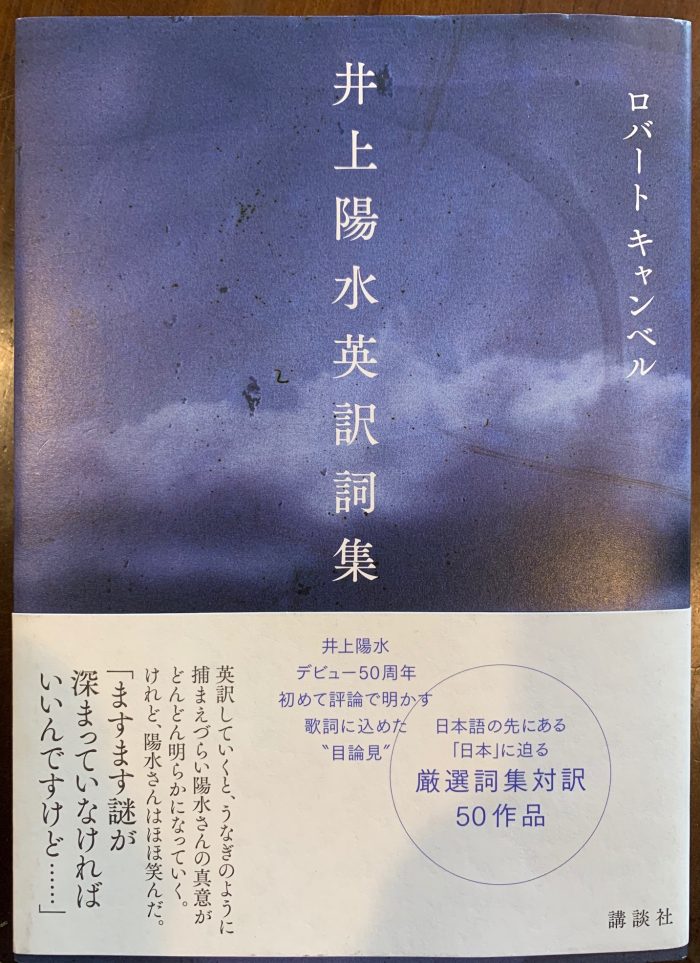
ジュンク堂の9階は芸術のフロア、楽譜に魅せられたけど、私の歌える調がいまいちつかめず、高価なので断念。片山杜秀の音楽の本も良さそうだったけど分厚すぎて見送り。
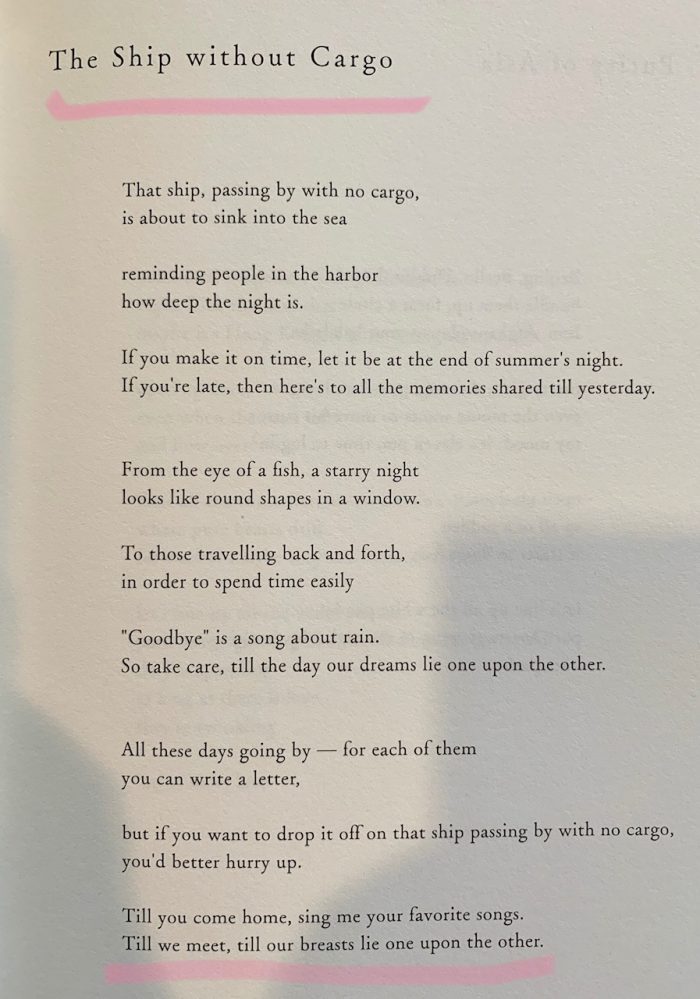
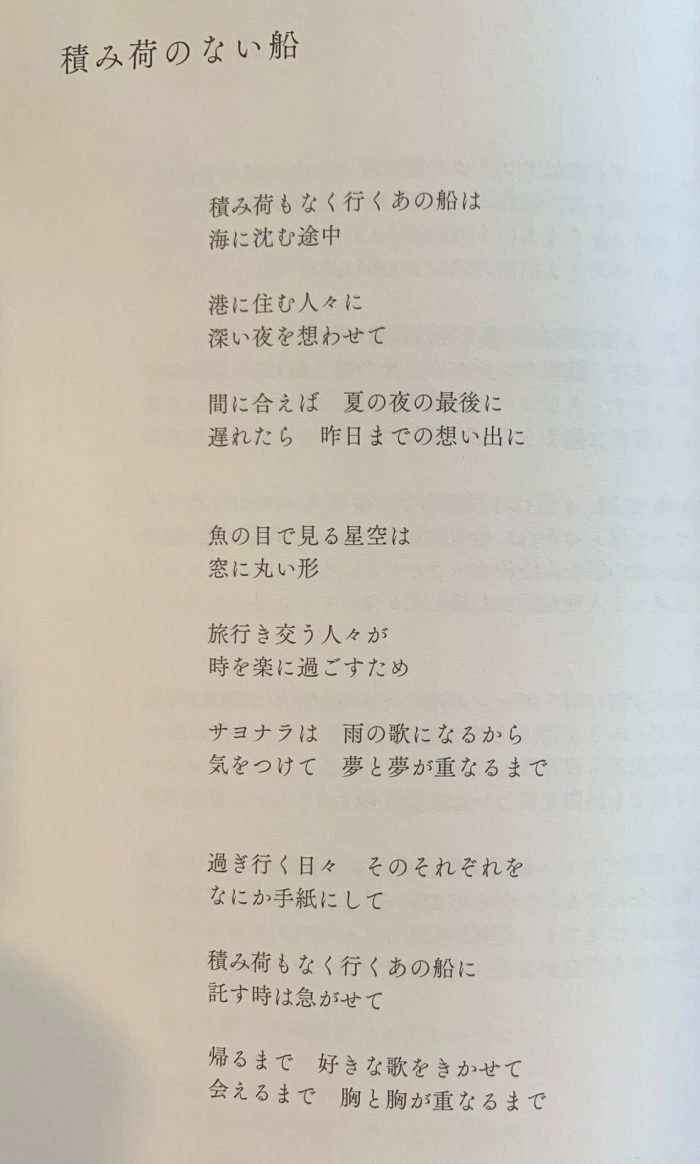
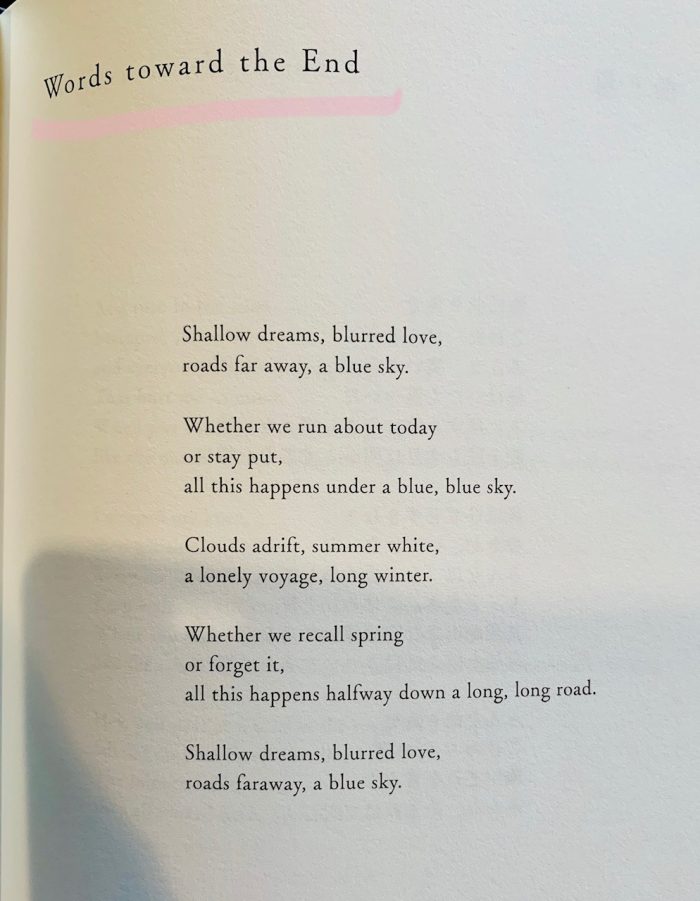
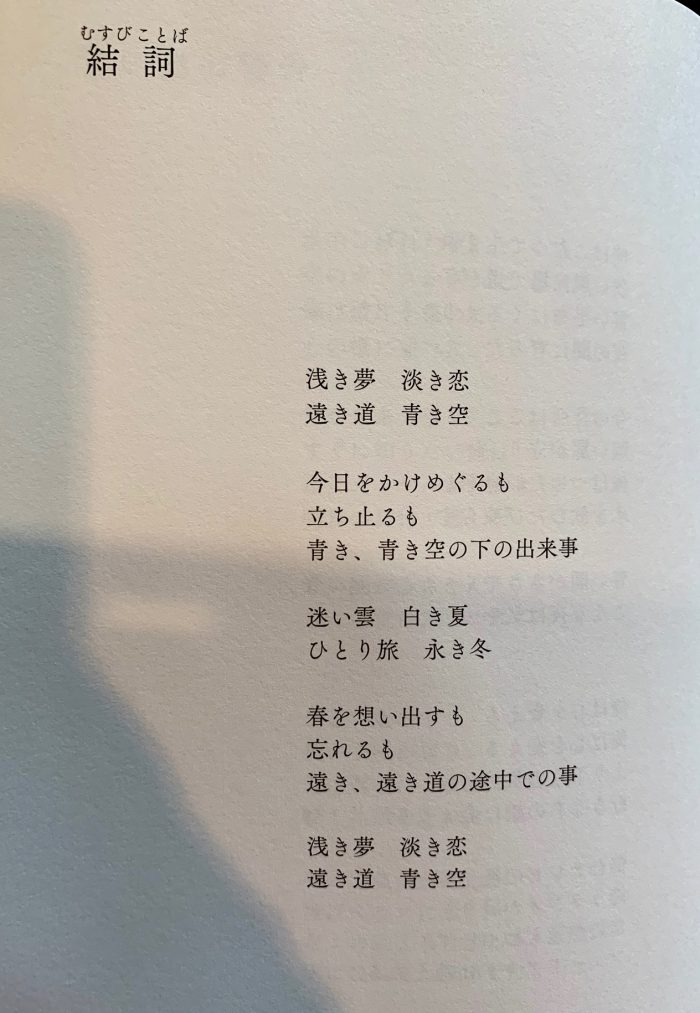
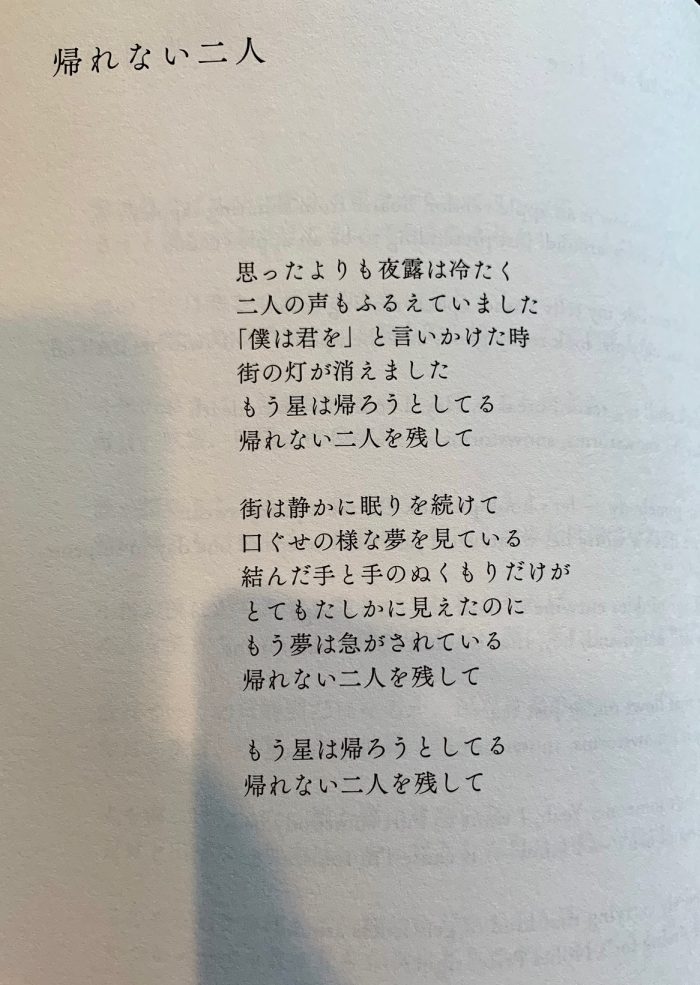
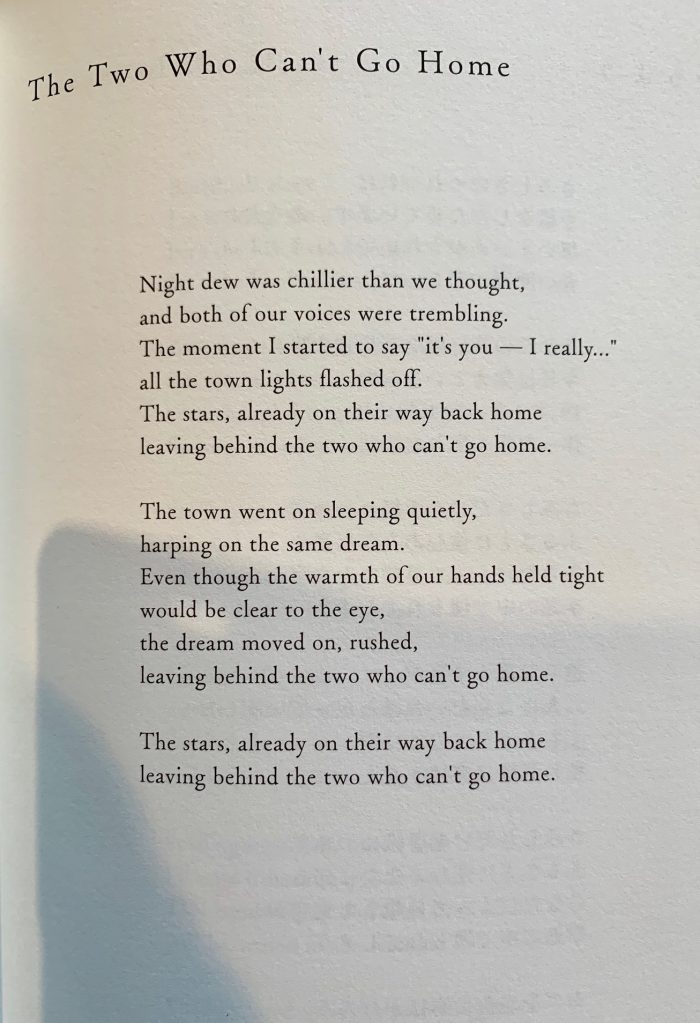
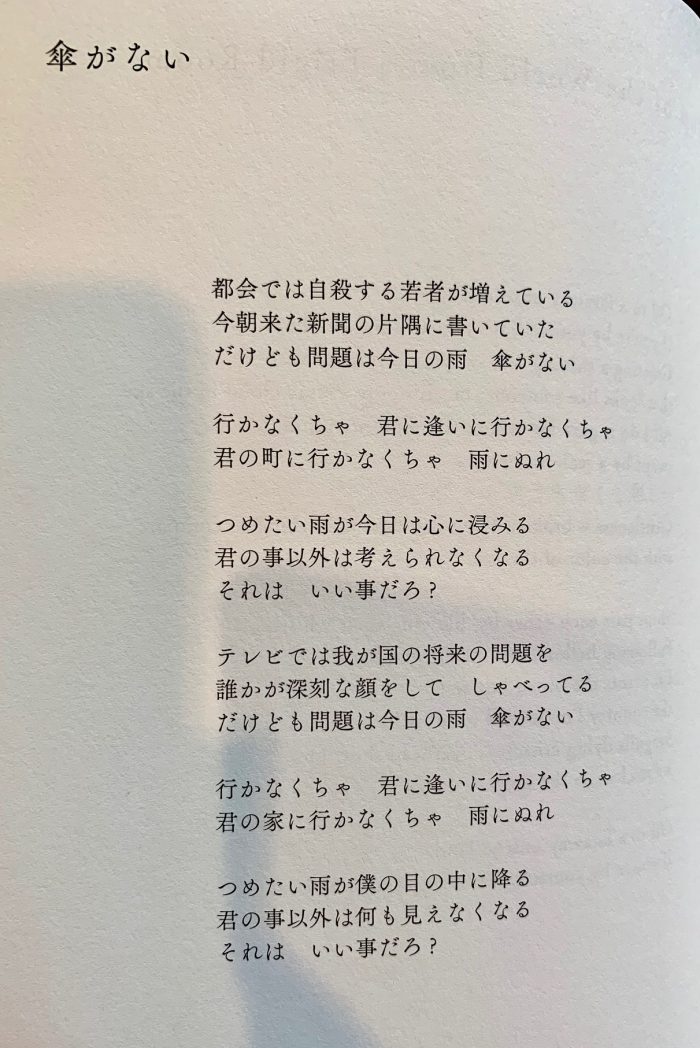
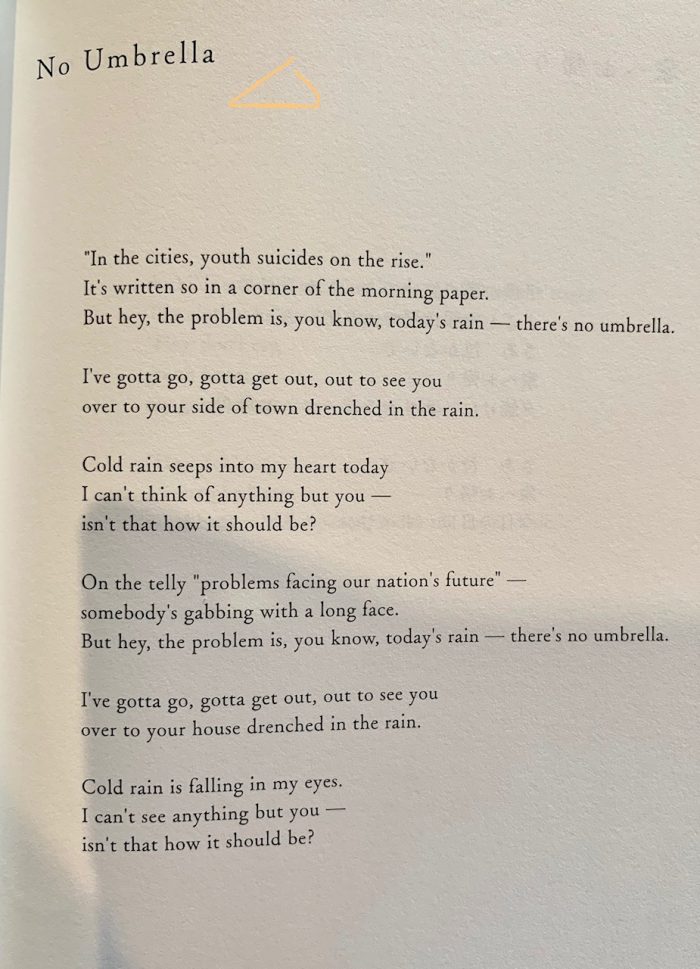
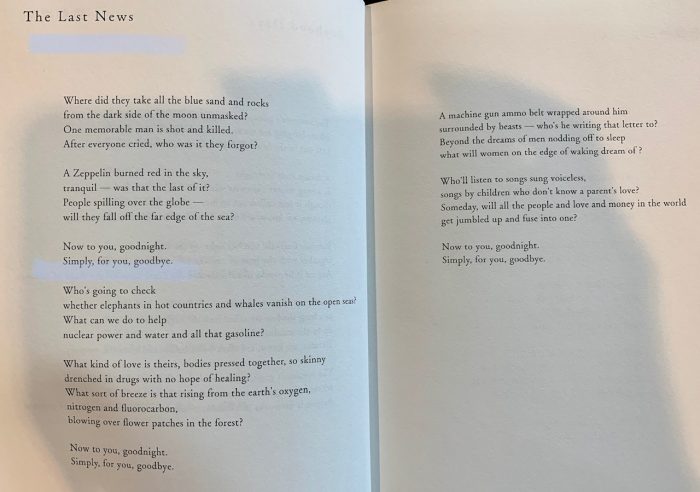
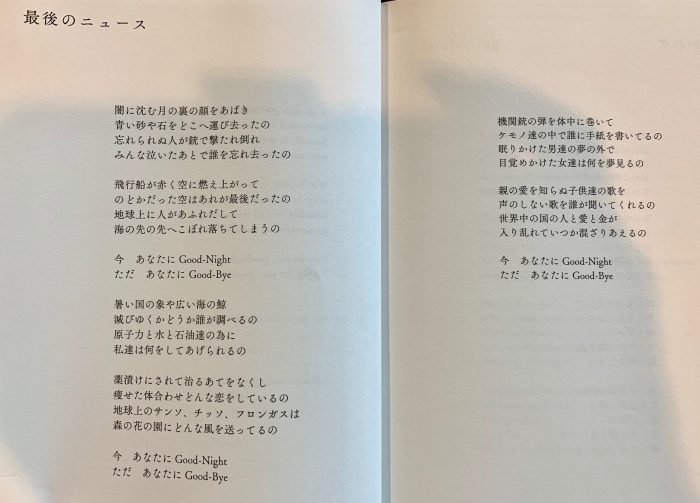
「傘がない」は、社会の問題に目を向けない若者について書いている。Robert Canbel 氏の理解は陽水の”逆説の逆説”にまでは気づいてないように思える。
Designed using Brigsby Premium. Powered by WordPress.